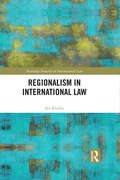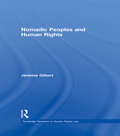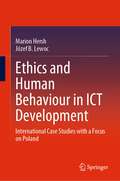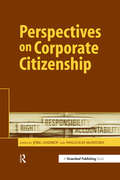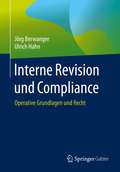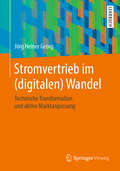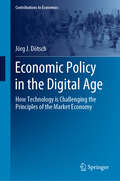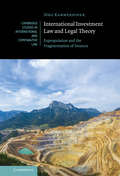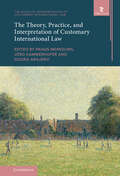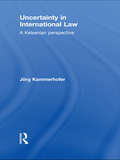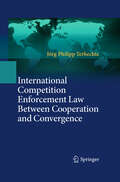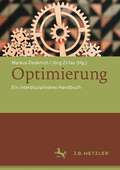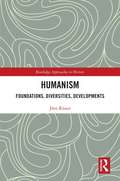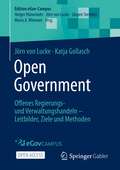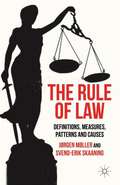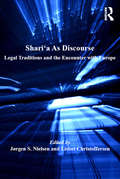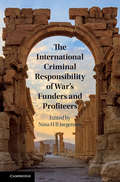- Table View
- List View
Regionalism in International Law (Routledge Research in International Law)
by Ján KlučkaInternational Law: Aspects of Regionalism evaluates regionalism in its various relationships and forms with respect to international law, as well as the importance and duties of international law in respect to the establishment and functioning of various forms of regional groups. A great deal of attention has been paid to regionalism from the global, political, ecocomic, security aspects, but a complex evaluation of the impact it has had on international law, and vice versa, is still lacking. The main purpose of this volume is to eliminate this gap and present the latest state of knowledge on the topic. This text will be of interest both to students at an advanced level, academics, and reflective practitioners. It addresses the topics with regard to international law and regionalism and will be of interest to academics dealing with legal aspects of current regionalism and for the specialized courses in the faculties of law, as well as anyone studying diplomacy and international studies, international relations, regional integration law, EU law, international law, and international relations.
Nomadic Peoples and Human Rights (Routledge Research in Human Rights Law)
by Jérémie GilbertAlthough nomadic peoples are scattered worldwide and have highly heterogeneous lifestyles, they face similar threats to their mobile livelihood and survival. Commonly, nomadic peoples are facing pressure from the predominant sedentary world over mobility, land rights, water resources, access to natural resources, and migration routes. Adding to these traditional problems, rapid growth in the extractive industry and the need for the exploitation of the natural resources are putting new strains on nomadic lifestyles. <P><P> This book provides an innovative rights-based approach to the issue of nomadism looking at issues including discrimination, persecution, freedom of movement, land rights, cultural and political rights, and effective management of natural resources. Jeremie Gilbert analyses the extent to which human rights law is able to provide protection for nomadic peoples to perpetuate their own way of life and culture. The book questions whether the current human rights regime is able to protect nomadic peoples, and highlights the lacuna that currently exists in international human rights law in relation to nomadic peoples. It goes on to propose avenues for the development of specific rights for nomadic peoples, offering a new reading on freedom of movement, land rights and development in the context of nomadism.
Balco Atlantico
by Jérôme FerrariIn a village square in Corsica lies the body of ardent nationalist, Stéphane Campana, shot down at close range. And over his body weeps Virginie, the young woman who has venerated Stéphane all her life - a veneration that has led her to abandon herself to him and his twisted desires completely.Meanwhile, brother and sister Khaled and Hayet, who once gazed out to sea from the shoreline path known as "Balco Atlantico" and dreamed of a better future, are now stranded in Corsica. As Ferrari traces the history of Stéphane and Virginie that leads to the shooting in the village square, we encounter the story of Khaled and Hayet and see through their story and the stories of many others in this one Corsican square how a relentless pursuit of happiness and fulfilment can bring us perilously close to despair and disillusionment.
Balco Atlantico
by Jérôme FerrariIn a village square in Corsica lies the body of ardent nationalist, Stéphane Campana, shot down at close range. And over his body weeps Virginie, the young woman who has venerated Stéphane all her life - a veneration that has led her to abandon herself to him and his twisted desires completely.Meanwhile, brother and sister Khaled and Hayet, who once gazed out to sea from the shoreline path known as "Balco Atlantico" and dreamed of a better future, are now stranded in Corsica. As Ferrari traces the history of Stéphane and Virginie that leads to the shooting in the village square, we encounter the story of Khaled and Hayet and see through their story and the stories of many others in this one Corsican square how a relentless pursuit of happiness and fulfilment can bring us perilously close to despair and disillusionment.
Ethics and Human Behaviour in ICT Development: International Case Studies with a Focus on Poland
by Marion Hersh Józef B. LewocEthics and Human Behaviour in ICT Development discusses ethics in a professional context and encourages readers to self-assessment of their own behaviour. It provides thought-provoking accounts of the little-known early history of technological development in information and communication technology (ICT) and the automation industry in Poland, with a focus on Wroclaw. The book provides a framework for understanding the relationship between ethics and behaviour, and analyses critically ethical and behavioural issues in challenging workplaces and social contexts. It includes:case studies from around the world, especially Poland, which illustrate the relationships between human behaviour and ethics;biographies of successful Polish ICT and automation leading designers;analysis of case studies of human behaviour and ethics in challenging industrial development and other environments; andillustrative practical applications alongside the theory of human behaviour and ethics. The authors demonstrate the ingenuity of the early Polish designers, programmers and other specialists in overcoming the shortage of components caused by import embargoes to enable Poland to develop its own computer industry. An example of this is Elwro, formerly the largest manufacturer of computers in Poland. The discussion of its growth illustrates the potential of human creativity to overcome problems. The discussion of its fall highlights the importance of ethical approaches to technology transfer and the dangers of a colonialist mentality. The book is designed for engineers, computer scientists, researchers and professionals alike, as well as being of interest for those broadly concerned with ethics and human behaviour.
Perspectives on Corporate Citizenship
by Malcolm McIntosh Jörg AndriofA number of disparate but interconnected forces such as deregulation and globalization, rapid advances in communications technology and the rise in the power of the consumer and civil society have now combined to bring corporate responsibility to prominence in many corporate boardrooms. In this information age, the ramifications of not addressing best practice in environment, workplace, marketplace and community could range from bad press coverage to complete market exclusion. These are perilous times for the social construct of modern capitalism.In today's society successful companies will increasingly be those that recognize that they have responsibilities to a range of stakeholders that go beyond compliance with the law. If in the past the focus was on enhancing shareholder value, now it is on engaging stakeholders for long-term value creation. This does not mean that shareholders are not important, or that profitability is not vital to business success, but that in order to survive and be profitable a company must engage with a range of stakeholders whose views may vary greatly. If in the past corporate social responsibility was simply seen as profitability plus compliance plus philanthropy, now responsible corporate citizenship means companies being more aware of and understanding the societies in which they operate. This means senior executives and managers being able to deal with a wide range of issues including greater accountability, human rights abuses, sustainability strategies, corporate governance codes, workplace ethics, stakeholder consultation and management.The aim and scope of Perspectives on Corporate Citizenship is to help capture and distil these and other emerging trends in terms of content, context and processes, in one concise volume. With contributions from the *crème de la crème* of leading thinkers from around the world, Perspectives on Corporate Citizenship is essential reading for students, scholars and all serious thinkers on one of the most critical issues of our time.
Interne Revision und Compliance: Operative Grundlagen und Recht
by Jörg Berwanger Ulrich HahnDas Buch zeigt die Grundlagen der Internen Revision, mit Blick auf die Compliance. Der Rechtsteil behandelt wesentliche Rechtsfragen beider Unternehmensfunktionen. Der operative Teil orientiert sich an den typischen Revisionsaufgaben und Revisionsprozessen im privatwirtschaftlichen und im öffentlichen Kontext – mit Spiegelung zu den Aufgaben der Compliance. Der Fokus liegt auf einer pragmatisch-praxistauglichen Darstellung, Erläuterung und Umsetzung der Berufsgrundlagen und Best Practices der Internen Revision.Das Werk bietet eine fundierte Übersicht über die Grundlagen und die Ursprünge der Compliance- und Revisionsarbeit – und geht dabei auf erfrischende Weise über den sonst üblichen rein rechtlichen Rahmen hinaus. Der Bezug auf aktuelle Themen, verbunden mit einer direkten und offenen Auseinandersetzung mit Fehlern und Schwachstellen im System der Unternehmenscompliance, machen das Buch zu einer sehr lesenswerten Lektüre.Jörg Nierhaus, LL.M., Chief Compliance Officer, Essen
Business Intelligence for New-Generation Managers: Current Avenues of Development
by Jörg H. Mayer Reiner QuickExecutives in Europe have significantly expanded their role in operations - in parallel to their strategic leadership. At the same time, they need to make decisions faster than in the past. In these demanding times, a redesigned Business Intelligence (BI) should support managers in their new roles. This book summarizes current avenues of development helping managers to perform their jobs more productively by using 'BI for managers' as their central, hands-on, day-to-day source of information - even when they are mobile.
Stromvertrieb im (digitalen) Wandel: Technische Transformation und aktive Marktanpassung
by Jörg Heiner GeorgIn diesem Lehrbuch wird ein grundlegendes Verständnis für Geschäftsmodelle speziell im Stromvertrieb vermittelt und wesentliche Funktionen des Betriebsmodells (Aufbau- und Ablauforganisation) erklärt. Dabei hat der Autor auf auf Praxisbezug Wert gelegt und sowohl die Treiber der Digitalisierung als auch die Wirkungsmechanismen der Transformation sowie datengetriebene Geschäftsmodelle beschrieben. Architektur und systematischer Aufbau möglicher Geschäftsmodelle sind anhand von Teilmodellen nachvollziehbar dargestellt und veranschaulicht. Das Buch hilft Studierenden energietechnischer, energiewirtschaftlicher und angrenzender Fachbereiche aktuelle Modelle zu verstehen, zu analysieren und schafft damit die Grundvoraussetzung diese Kenntnisse im späteren Berufsleben einzusetzen.
Economic Policy in the Digital Age: How Technology is Challenging the Principles of the Market Economy (Contributions to Economics)
by Jörg J. DötschThis book addresses how digital technology is challenging the principles of the market economy and the consequences for economic policy. Applying the approach of the Freiburg School as a heuristic perspective, the study examines the concrete effects of digital technology on the price system and monetary policy, the openness of markets, the role of private property, and labour markets. It highlights the emergence of digital innovations such as digital currencies, digital goods, artificial intelligence, digital platforms and the sharing economy and discusses the challenges these innovations pose for economic governance and the development of adequate economic policy instruments. This comprehensive overview provides a basic understanding of the scope of the digital transformation and addresses a wide scale of important aspects of e.g. competition and trade policy, the impact of robotisation on labour market policy, and how economic policy must incorporate social aspects. The book appeals to scholars and students of economics, public management professionals, and anyone interested in the challenges of digitalisation in the context of economic policy.
International Investment Law and Legal Theory: Expropriation and the Fragmentation of Sources (Cambridge Studies in International and Comparative Law)
by Jörg KammerhoferExpropriation is a hotly debated issue in international investment law. This is the first study to provide a detailed analysis of its norm-theoretical dimension, setting out the theoretical foundations underlying its understanding in contemporary legal scholarship and practice. Jörg Kammerhofer combines a doctrinal discussion with a theoretical analysis of the structure of the law in this area, undertaking a novel approach that critically re-evaluates existing case-law and writings. His approach critiques the arguments for a single expropriation norm based on custom, interpretation and arbitral precedents within international investment law, drawing also on generalist international legal thought, to show that both cosmopolitan and sovereigntist arguments are largely political, not legal. This innovative work will help scholars to understand the application of theory to investment law and help specialists in the field to improve their arguments.
The Theory, Practice, and Interpretation of Customary International Law (The Rules of Interpretation of Customary International Law)
by Jörg Kammerhofer Noora Arajärvi Panos Merkouris Nina MilevaAlthough customary international law (CIL) has been central to international law from its inception, it is often misunderstood. This edited volume remedies that problem by tracing the history of CIL and provides an in-depth study of its theory, practice, and interpretation. Its chapters tackle the big questions which surround this source of international law such as: what are the rules that regulate the functioning of CIL as a source of international law? Can CIL be interpreted? Where do lines between identification, interpretation, application, and modification of a rule of CIL lie? Using recent developments, this volume revisits old debates and resolves them by proffering new and innovative solutions. With detailed examples from international and national courts, it places CIL in a range of settings to explain, explore and reflect upon this developing and highly significant field. This title is also available as Open Access on Cambridge Core.
Uncertainty in International Law: A Kelsenian Perspective
by Jörg KammerhoferRe-engaging with the Pure Theory of Law developed by Hans Kelsen and the other members of the Viennese School of Jurisprudence, this book looks at the causes and manifestations of uncertainty in international law. It considers both epistemological uncertainty as to whether we can accurately perceive norms in international law, and ontological problems which occur inter alia where two or more norms conflict. The book looks at these issues of uncertainty in relation to the foundational doctrines of public international law, including the law of self-defence under the United Nations Charter, customary international law, and the interpretation of treaties. In viewing international law through the lens of Kelsen’s theory Jörg Kammerhofer demonstrates the importance of the theoretical dimension for the study of international law and offers a critique of the recent trend towards pragmatism and eclecticism in international legal scholarship. The unique aspect of the monograph is that it is the only book to apply the Pure Theory of Law as theoretical approach to international law, rather than simply being a piece of intellectual history describing it. This book will of great interest to students and scholars of public international law, legal theory and jurisprudence.
Free Will: Historical and Analytic Perspectives
by Jörg Noller Marco HausmannThis novel contributed volume advances the current debate on free will by bridging the divide between analytic and historically oriented approaches to the problem. With thirteen chapters by leading academics in the field, the volume is divided into three parts: free will and determinism, free will and indeterminism, and free will and moral responsibility. The contributors aim to initiate a philosophical discourse that profits from a combination of the two approaches. On the one hand, the analytic tools familiar from the debate – arguments, concepts, and distinctions – can be used to sharpen our understanding of classical philosophical positions. On the other hand, the rich philosophical tradition can be reconstructed so as to inspire new solutions. In recent years, the problem of free will has received special attention in the analytic arena. This is the first anthology to combine historical and analytic perspectives, significantly furthering the debate, and providing a crucial resource to academics and advanced students alike.
International Competition Enforcement Law Between Cooperation and Convergence
by Jörg Philipp TerhechteThe international dimensions of competition law and policy are most often examined at the level of substantive law. In this legal area both intentional and spontaneous assimilation and harmonization trends can be recognized, which manifest themselves e.g. in comparable approaches to combating particularly harmful restraints (so-called "hardcore cartels"). However, the complex terrain of enforcement law has been mainly ignored up to date. Are there common approaches in this field as well? How are the various competition laws linked with each other in respect to procedural norms? This book conceptualizes "International Competition Enforcement Law" against the backdrop of these issues and at the level of comparative law. The ciphers "cooperation" and "convergence" will serve as the two principle ideas for this book.
Nachhaltigkeit in Unternehmen integrieren: Strategische Planung – Umsetzung – Monitoring (essentials)
by Jörg ThiemannGesetzgeber, Kunden und Mitarbeiter fordern von Unternehmen ökologisches Handeln sowie soziales Arrangement. Unternehmerische Aktionen sind dabei nicht neu, jedoch wird ein ganzheitlicher Ansatz, eine sogenannte Corporate Responsibility (CR), gefordert. Was dies im Einzelnen bedeutet und wie eine CR im Unternehmen umgesetzt werden kann, zeigt dieses Essential. Neben Erklärungen der Bedeutung der wichtigsten Fachterminologien und ihrer Zusammenhänge, wird der Prozess hin zu einem nachhaltigen Unternehmen beschrieben. Da nur ein sichtbares CR gemessen und somit verbessert werden kann, sind auch Methoden zur Erzeugung der Sichtbarkeit und zur Messbarmachung des CR enthalten.
Optimierung: Ein interdisziplinäres Handbuch
by Jörg Zirfas Markus DederichDieses interdisziplinäre Handbuch rekonstruiert Optimierung als ein Phänomen, das konstitutiv in aktuelle Entwicklungen der Gegenwart eingeschrieben ist. Denn es erscheint kaum mehr möglich, nicht optimieren zu wollen oder zu können. Das gilt für die Arbeit an sich selbst, die Verbesserung des Anderen und die Perfektionierung der Welt. Optimierung verspricht messbare Steigerungen von Effektivität und Effizienz sowie eine Erweiterung der Reichweite von Einfluss und Macht. Sie wirft aber auch Fragen der Instrumentalisierung, der Verdinglichung und Entfremdung sowie Fragen nach Grenzen und Unverbesserlichkeiten auf. Ohne eine Auseinandersetzung mit der Idee der Optimierung lässt sich eine moderne Humanwissenschaft heute nicht mehr konzipieren.
Unschärferelationen: Konstruktionen der Differenz von Politik und Recht (Politologische Aufklärung – konstruktivistische Perspektiven)
by Jörn Knobloch Thorsten SchleeDas prekäre Verhältnis von Politik und Recht ist ein beständiges Thema der Politikwissenschaft und öffentlicher demokratischer Diskurse. Die in diesem Band versammelten Beiträge fokussieren das umstrittene Verhältnis von Politik und Recht in Auseinandersetzung mit konstruktivistischen Theorien der Politik. Sie weisen das Verhältnis zweier Semantiken und die ihm zugeschriebenen Kausalitätsbeziehungen in der Zusammenschau als Unschärferelationen aus. Der Band identifiziert die Unschärfen des Zusammenspiels von Politik und Recht in Fragen der Gründung von Demokratie und Verfassung, in den Diskursen um die Politisierung der Verfassungsgerichtsbarkeit wie umgekehrt der Verrechtlichung des Politischen und nicht zuletzt in Kontexten der Produktion internationaler Normen wie auch der Kollision internationaler Rechtsregime.
Humanism: Foundations, Diversities, Developments (Routledge Approaches to History)
by Jörn RüsenThe book describes humanism in a systematic and historical perspective. It analyzes its manifestation and function in cultural studies and its role in the present. Within the book, special attention is given to the intention of contemporary humanism to overcome ethno-centric elements in the cultural orientation of contemporary living conditions and to develop humane dimensions of this orientation. This is linked to a fundamental critique of the current post-human self-understanding of the humanities. Furthermore, the intercultural aspect in the understanding of humanism is emphasized; for non-Western cultures also have their own humanistic traditions. Two further aspects are also addressed: the Holocaust as the most radical challenge to humanistic thinking and the relationship of humanism to nature. Sitting at the intersection of history and philosophy, the book is perfect for those exploring humanism from an historical perspective.
Open Government: Offenes Regierungs- und Verwaltungshandeln – Leitbilder, Ziele und Methoden (Edition eGov-Campus)
by Jörn von Lucke Katja GollaschDieses Buch – eine Open-Access-Publikation mit freiem Online-Zugang – bietet Führungskräften und Mitarbeitenden im öffentlichen Sektor sowie Studierenden eine ebenso kompakte wie kompetente Einführung in die wesentlichen Aspekte von Open Government. Das Konzept Open Government (offenes Regierungs- und Verwaltungshandeln) beschreibt einen Kulturwandel von Politik und Verwaltung hin zu mehr Transparenz, Partizipation der Zivilgesellschaft und Zusammenarbeit innerhalb des öffentlichen Sektors als auch mit Akteuren aus Wirtschaft und Wissenschaft. Durch die Digitalisierung und des Angebots offener Daten ergeben sich für Politik und Verwaltung neue Möglichkeiten der Interaktion und der Offenlegung von Entscheidungen. Das Buch bietet einen kompakten Einstieg in Themen wie Transparenz, Bürgerbeteiligung, Zusammenarbeit sowie der Öffnung von Datenbeständen. Ebenso wird die Teilnahme Deutschlands an der Open Government Partnership vorgestellt. Durch direkte Verlinkungen auf vorbildhafte Beispiele für ein offenes Regierungs- und Verwaltungshandeln in der Praxis sowie ein digitales Karteikartensystem wird umfangreiches Wissen anschaulich und zielgerecht vermittelt.Die Leser werden mit Leitbildern, Zielen und Methoden im Bereich Open Government vertraut gemacht und können diese kritisch reflektieren Im Sinne von Offenheit ist dieses Werk eine Open-Access-Publikation mit freiem Online-Zugang.Aus dem InhaltOpen Government – Grundlagen eines offenen Regierungs- und Verwaltungshandelns Transparenz 2.0Offene Daten und offene Verwaltungsdaten – Öffnung von DatenbeständenOpen Budget – Öffnung des HaushaltswesensBürgerbeteiligung 2.0 Zusammenarbeit 2.0Aktivitäten Deutschlands in der Open Government PartnershipInklusive kostenlosem Online-Wissens-Quiz mit der Springer Nature Flashcards-App - laden Sie die App im App-Store; geben Sie den Code 7C174-C91BD-C687A-B7DAE-FE989 ein, um den Online-Quiz zu laden
The Rule of Law
by Jørgen Møller Svend-Erik SkaaningThrough critical analysis of key concepts and measures of the rule of law, this book shows that the choice of definitions and measures affects descriptive and explanatory findings about nomocracy. It argues a constitutionalist legacy from centuries ago explains why European civilizations display higher adherence to rule of law than other countries.
Globalisation and Agricultural Landscapes: Change Patterns and Policy Trends in Developed Countries
by Jørgen Primdahl Simon SwaffieldWhilst agricultural landscapes are products of the local ecosystem and community in which they are situated, they are becoming increasingly affected by the same global issues, and are converging under the dynamics of globalisation. Combining landscape ecological research and an examination of relevant public policy, this book investigates the dynamic relationship between agricultural landscapes and the global change processes, such as urbanisation, by which they are being transformed. Landscape change is analysed in the context of biophysical patterns, market dynamics, and specific public policy frameworks, through a series of case studies from different OECD countries spanning Europe, Asia Pacific and North America. Particular emphasis is placed upon the way that landscapes are changing under differing policies of agricultural subsidy including the EU Common Agricultural Policy. This is an ideal resource for graduate students and researchers in landscape ecology and agriculture as well as policy analysts working in the agricultural sector.
Belief, Law and Politics: What Future for a Secular Europe? (Cultural Diversity and Law in Association with RELIGARE)
by Marie-Claire Foblets Jørgen S. Nielsen Katayoun Alidadi Zeynep YanasmayanThis edited collection gathers together the principal findings of the three-year RELIGARE project, which dealt with the question of religious and philosophical diversity in European law. Specifically, it covers four spheres of public policy and legislation where the pressure to accommodate religious diversity has been most strongly felt in Europe: employment, family life, use of public space and state support mechanisms. Embracing a forward-looking approach, the final RELIGARE report provides recommendations to governance units at the local, national and European levels regarding issues of religious pluralism and secularism. This volume adds context and critique to those recommendations and more generally opens an intellectual discussion on the topic of religion in the European Union. The book consists of two main parts: the first includes the principal findings of the RELIGARE research project, while the second is a compilation of 28 short contributions from influential scholars, legal practitioners, policy makers and activists who respond to the report and offer their views on the sensitive issue of religious diversity and the law in Europe.
Shari‘a As Discourse: Legal Traditions and the Encounter with Europe (Cultural Diversity and Law)
by Jørgen S. Nielsen Lisbet ChristoffersenThis volume exposes some of the various issues raised in relation to Muslim communities in Europe by putting the intellectual and legal traditions into dialogue. It brings together a number of scholars of Shari’a and Islamic law with counterparts from the parallel European disciplines of hermeneutics, philosophy and jurisprudence, to explore how the processes of theological-legal thinking have been expressed and are being expressed in a more or less common intellectual framework. It provides a valuable reference for all those interested in exploring how Muslims and non-Muslims view Shari’a law, looking at ways the European legal systems can provide some form of accommodation with Muslim customs.
The International Criminal Responsibility of War's Funders and Profiteers
by Jørgensen, Nina H. B.This book is concerned with the commercial exploitation of armed conflict; it is about money, war, atrocities and economic actors, about the connections between them, and about responsibility. It aims to clarify the legal framework that defines these connections and gives rise to criminal or, in some instances, civil responsibility, referring both to mechanisms for international criminal justice, such as the International Criminal Court, and domestic systems. It considers which economic actors among individuals, businesses, governments and States should be held accountable and before which forum. Additionally, it addresses the question of how to recover illegally acquired profits and redirect them to benefit the victims of war. The chapters shine a critical light on the options provided by a network of laws to ensure that the 'great industrialists' of our time, who find economic opportunities in the war-ravaged lives of others, are unable to pursue those opportunities with impunity.
